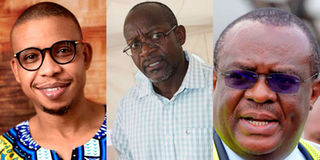The hidden heroes in Covid fight

From left: Dr Ahmed Kalebi, Prof Omu Anzala and Dr Willis Akhwale.
What you need to know:
- The little-known professionals provide data and other technical details that eventually inform actions regarding the virus.
- The pandemic has helped to highlight some of the unseen professions that help to make our health system work.
To contain the spread of the novel coronavirus, medical experts have been working behind the scenes to ensure that everything is in order.
This includes ensuring that Covid-19 tests are done on time, critical equipment in health facilities are functioning and modelling statistics and projections to determine infection trends in the country.
But little is known about these particular people.
The little-known professionals provide data and other technical details that eventually inform actions regarding the virus.
They are in charge of different sectors, including Covid-19 testing, border control, contact tracing, case management, mortuary monitoring and projection of cases.
This pandemic has helped to highlight some of the unseen professions that help to make our health system work, and to show the positive impact that they can have on people’s lives.
Dr Ahmed Kalebi, consultant pathologist
“Pathologists are like civil engineers, nobody ever gets to hear about them until a building collapses, and then they are blamed for a shoddy job even if the mistake is not theirs. With Covid-19, pathologists became one of the most important professions,” says Dr Kalebi.
Before Covid-19, Lancet Kenya, which was one of the first African laboratories to be accredited to test for the virus, would handle about 1,000 patient tests a day.,however, during the various waves in the country, the numbers doubled.
“When we first recorded the virus in the country, most of my employees were afraid to get to the lab to do a Covid-19 test, I would be in the lab for 24 hours, I lost about eight kilos last year,” says the former Lancet Kenya boss.
It is from what pathologists do that the country is able to tell how the virus is spreading within the community, the trends and the variants in the country.
Millicent Aloo, Biomedical Engineer, secretary-general of the Association of Medical Engineers of Kenya
“We have never been recognised as an important group in health care in the country, we are never grouped with the health care workers, yet we are very influential,” she says
With the increased demand for ventilators and other equipment, and the increase in the number of patients in ICUs, biomedical engineers have played an important role in patient care.
Ms Aloo says that before the pandemic, most hospitals contracted other kinds of engineers to work on the underutilised machines. However, with Covid-19, most machines were in use throughout, so hospitals noticed the importance of a biomedical engineers. They hired dedicated experts because there were massive machine failures.
Biomedical engineer design, build and maintain medical equipment and devices used in the management of various diseases.
Dr Willis Akhwale, chairman of National Covid-19 Vaccines Task Force
Before his appointment to the Covid-19 vaccine task force, no Kenyan would recognise him. Now, he is the man of the moment.
“With the virus, I have had sleepless nights ensuring that vaccine are here and Kenyans are getting vaccinated. It is not easy, but the urge to protect our people overrides everything,” he says.
Dr Akhwale continues to use his extensive experience to lead the significant work of finding, procuring and delivering vaccines to support the largest vaccination programme in the country.
The vaccine task force has done a tremendous job of securing the vaccines, with the country having received over seven million doses. As of yesterday, over 4.4 million doses had been administered across the country.
The government is working towards vaccinating 10 million Kenyans by end of this year.

Prof Matilu Mwau (left) and Millicent Aloo, Biomedical Engineer, secretary-general of the Association of Medical Engineers of Kenya.
Prof Matilu Mwau, infectious disease specialist
“My life as a scientist and researcher was normal before Covid-19. I had a normal job that involved getting to the office at 9am and leaving at 8pm depending on the day. But with Covid-19, I arrive even as early as 5am in the morning, leave at 1 am and I am back again at 6am in the morning,” he says.
As a published author in different journals, he was involved in manuscript writing, but last year, he didn’t publish any because of the huge projects that involved Covid-19 research.
Before, he engaged in HIV research and viral load testing, which did not have work, but with Covid-19, people got burnout and were even infected in the course of work.
“We were almost closing down, it was crazy. I have never had a social life since Covid-19 landed here. We work 24 hours to ensure that this virus is controlled,” he says.
Prof Omu Anzala, virologist/immunologist
“The virus has greatly affected other areas of research, with many forgetting that people are still battling HIV, which is becoming a forgotten killer,” he says.
Before Covid-19, Prof Anzala’s work was majorly on getting a HIV vaccine, which is still ongoing. However, with the novel coronavirus, they have had to scale down on other research projects and focus on the virus.
“Because most funders have repurposed funding, we have had to scale down and concentrate on the virus. We are looking at the evolution of the virus in our population and immune response within our country,” says Prof Anzala.
Virologists identify different viruses and their properties through microscopic examination while determining how viral diseases spread through populations. Immunologists study immune responses to various pathogens.





